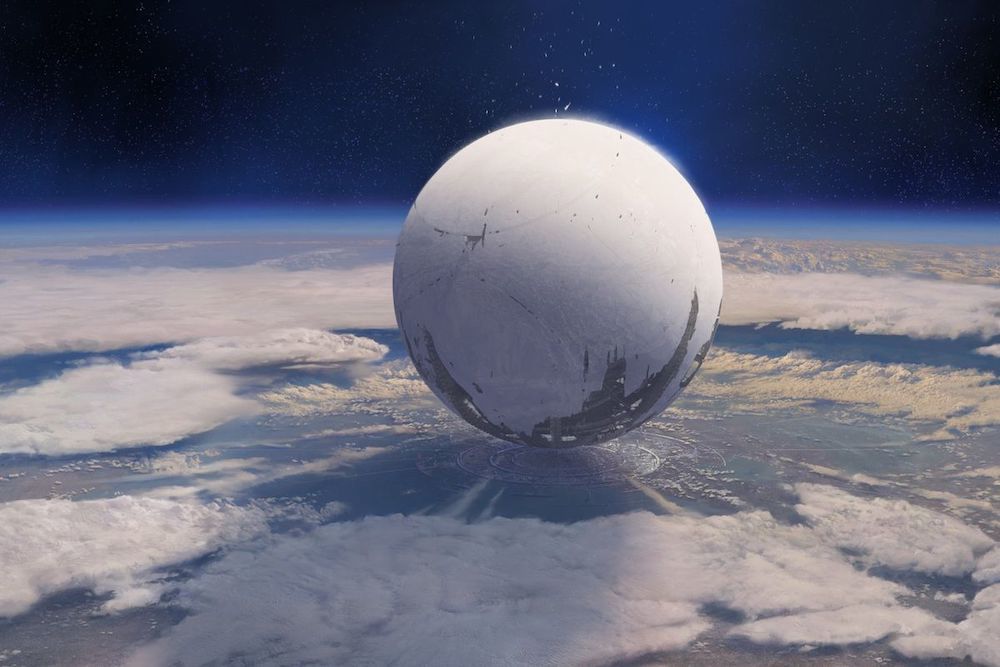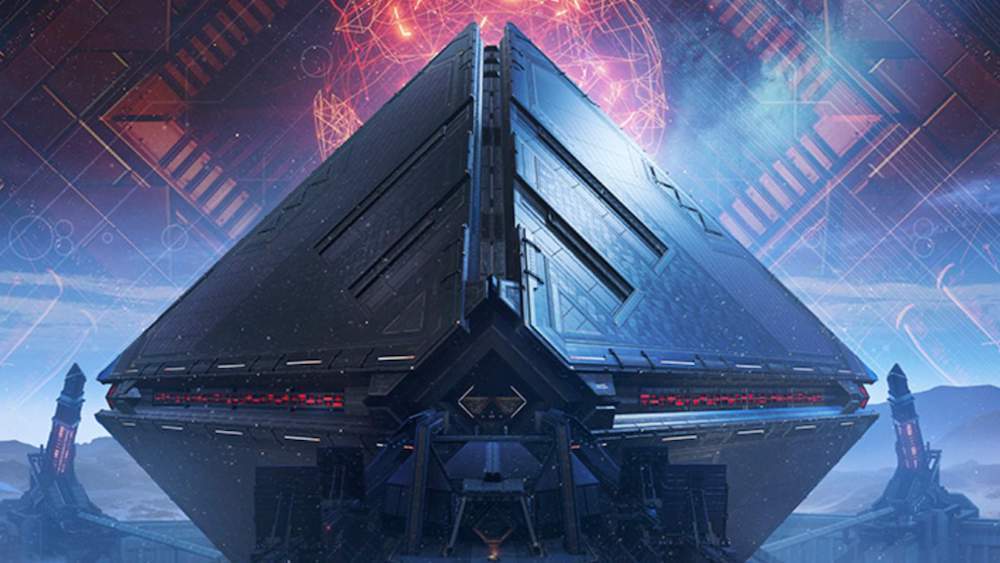There's a new quest in Destiny 2's Season of the Worthy this week, and while it's only slowly unfolding, it could be very important to the overall story the game has been building over the last year and a half. "The Lie" concerns Rasputin, the artificially intelligent Warmind at the center of this season's tale. Given the backstory of Rasputin and some hints we've been seeing over the last few seasons, The Lie could have some major implications--and it could be the next step toward developing a new kind of conflict in the fourth year of Destiny 2.
Rasputin is a character who has existed since the start of the original Destiny, and yet one we know little about. During the Golden Age, the period of prosperity that started with the arrival of the Traveler in Destiny lore, Rasputin had control of defenses for the entire solar system. It is possibly the only character in Destiny who was present for the big apocalyptic event known as The Collapse. Rasputin's connections with all those defenses were cut over the centuries that followed the Collapse; most of the Season of the Worthy has been centered around restoring Rasputin's capabilities so it can shoot down a giant Cabal spaceship, the Almighty, before it crashes into the Last City and kills everybody.
Reconnecting Rasputin to its defenses has given the computer a whole bunch of power, something that a few Destiny characters have voiced concerns over. Since Rasputin was first rediscovered back in Destiny 1, Zavala has been concerned that the Warmind shouldn't be trusted. After all, despite having an army of Guardians on its side, humanity is on its last legs in the Destiny universe. A rogue computer with a bunch of orbital weapons satellites is not an enemy that the Guardians' leadership, the Vanguard, really wants to have to deal with. And while Rasputin's mandate is to protect humanity, who knows how exactly it might decide to go about that--or whether his internal circuitry is in prime condition hundreds of years after his construction.
Over the course of the Season of the Worthy, Zavala has seemingly come around on trusting Rasputin to keep humanity's best interests at heart. But there's definitely more to Rasputin's story than we yet know, and it seems like we might learn some of it with "The Lie." If the story pans out in the direction it seems like Bungie has been pushing things, it could be another step toward introducing an ideological conflict to the game, to go along with the shooty kind.

The Collapse, The Darkness, And The Traveler
To get where things seem to be headed, you first need to know about a theory that a lot of players hold about Rasputin's story, based on various clues scattered throughout Destiny lore. That theory is that it wasn't the enemies of the Traveler that attacked and disabled it during the Collapse, as was commonly believed throughout Destiny's story up until now--it was Rasputin. Given what's happened so far this year, it seems like that could be the lie Destiny 2 is about to reveal in its story.
The thing about the Traveler, the benevolent robot god that hovers over Destiny's Last City and provides Guardians with their superpowers and immortality, is that we don't actually know much about it or its motivations. In the backstory of Destiny, the Traveler showed up in the solar system and ushered in a new era of prosperity, in which humanity made huge leaps forward, spread throughout the system, terraformed whole planets, and basically built a utopia. But then the Traveler's enemies, known as the Darkness, arrived to attack it. Something more or less unknown happened--the Collapse--and the Darkness was beaten back, but the Traveler was disabled and left dormant for hundreds of years afterward, all the way up to when the games take place.
Though the Traveler did a lot of good for humanity, this wasn't the first time it showed up and elevated a civilization to utopia. The Traveler previously did that with the Eliksni, the alien race of enemies also known as the Fallen. They're the folks the Traveler visited before us, and they too were attacked by the Darkness (or more specifically, it seems, the Hive aliens players also fight in Destiny). Fallen society was just as ravaged as humanity's in an event they call the Whirlwind--and though it's not 100% clear, there's a suggestion in the lore that the Traveler might have abandoned the Fallen to their fate.
The theory among many (but, it should be noted, by no means all) Destiny fans who pay attention to the lore is that Rasputin recognized the Traveler would bail on humanity when its enemies came calling, dooming the human race to destruction in an event similar to the Whirlwind. The only way to prevent utter destruction was to blast the Traveler, forcing it to stay near Earth, and thus use its power to defend itself. That's apparently what happened; the Traveler's power drove off the Darkness (in an event that also created the Awoken, but that's another very long story), and it created the Ghosts to build an immortal army to protect itself while it healed.

Rasputin's Secret
Last season, we saw a cutscene in which Osiris confronted Rasputin after learning something important through all his time travel shenanigans, but didn't say what--but presumably, what Osiris learned that would make him so mad was that Rasputin attacked the Traveler. If that's revealed in The Lie (or if it's another step toward that reveal), we'll likely also learn why: Tthe Traveler would have abandoned humanity to its fate. And that revelation would go on to recolor a lot of Destiny's standing lore and the attitudes of its characters, many of whom revere and even worship the Traveler.
(It also seems possible, especially given Rasputin-related flavor text in this season and some lore evidence from the past, that the Traveler wasn't about to abandon humanity--but Rasputin made the call to shoot it anyway. That might have released the wave of Light energy that drove off the Darkness and stopped the Collapse, with Rasputin sacrificing the Traveler to save everyone else. You could also take this as evidence that Rasputin didn't shoot the Traveler--but the story definitely seems to be hinting at something potentially shameful in Rasputin's past. The point is that it's an ambiguous "do the ends justify the means" kind of situation.)
Here's the thing: For the whole of the Destiny franchise, the story has been about the good Light, a powerful force born from the Traveler, fighting the evil Darkness, the enemies of the Traveler. Almost all of the characters of the game see the Traveler as a nearly infallible force of good. But if Rasputin had to shoot the Traveler to stop it from abandoning billions to save itself, that calls into question all the beliefs the entire story of Destiny is built on. It has the potential to rock every character in the game to their core.
And really, that's where Destiny 2 has been heading for at least the last year. Many of the major story beats since the start of Destiny 2's second year have concerned the idea that maybe the dichotomy between Light and Dark isn't quite so stark. Occasional lines of dialogue pop up from various characters, like Emperor Calus and his robot minions, that caution you about putting too much faith in the Traveler, like they know something you don't. And there's a big threat looming on the literal horizon, and Destiny has been suggesting that it'll take more than just the Light to defeat it.

Embracing The Dark Side
Up until now, the "Darkness" has been a sort of unquantified but malevolent force, but at the end of Destiny 2's vanilla campaign, we started to get a sense of the actual people that term referred to. The post-credits scene of that campaign showed a bunch of pyramid-shaped spaceships waking up because of a wave of Light energy given off by the Traveler at the end of the story. One of those pyramid ships was discovered on the moon in the Shadowkeep expansion, and at the end of that campaign, we even spoke with the people who fly them. They told us that the Light was actually bad--that it abandons you when you need it most--and that the Darkness people are neither enemy nor friend, but will be our "salvation."
Over the last year of Destiny 2, Bungie has been blurring the moral lines between the Light and the Darkness, and raising questions about whether using the power of the Darkness is all bad. The entire activity of Gambit, added with the Forsaken expansion in Year Two, is about gathering and harnessing Dark energy, potentially as a means to deal with the threat of the pyramids. The backstory of the Drifter, the guy who runs Gambit, suggests he came into closer contact with the Darkness than just about anybody else ever has and survived to tell about it. We still don't know what the Drifter's plans are, but we do know that he thinks it's necessary in order to survive whatever's on its way to the solar system.
And that threat is on the way, arriving imminently. For a few weeks now, Rasputin's bunkers have shown a display tracking the proximity of the pyramid ships, and they're quickly reaching the outer edges of the solar system. Their arrival could happen as soon as Destiny 2's next content season, which kicks off in June.
When they get here, it seems likely they're not going to be aggressive, necessarily--they're going to be seductive, in a Dark-Side-of-the-Force kind of way. They'll offer Guardians power, like what the Kentarch 3 encountered in the Garden of Salvation, or what tempted Dredgen Yor and the Shadows who followed him. And if The Lie establishes that the Traveler isn't the perfect benevolent god, and in fact is it exactly what the Darkness portrays it to be, it'll be all the more tempting to give into the Darkness and its powerful gifts for the game's characters--and for the Guardians that serves as its heroes. Who knows exactly what that'll lead to, whether it's another branching story like the one where players had to choose between the Drifter and the Vanguard a few seasons ago, or proof of the rumor that Destiny will eventually split Guardians into two factions: Light and Dark.
Destiny has slowly been inching toward its world being far less black-and-white than much of the story has portrayed it thus far. We're poised to see the story of Destiny evolve in some huge ways as tons of tiny threads seem poised to finally come together. I might be wrong about what Rasputin means to tell us in The Lie, but even if that theory doesn't pan out, it's hard to deny that Bungie's MMO is on the precipice of a major shift that'll add more nuance to the game than it's ever had before.
Destiny 2 News And Guides
- Destiny 2 King's Fall Raid Guide: How To Beat Every Encounter And Open Every Secret Chest
- Five Years Of Destiny 2's Dramatic, Transformational Changes
- Destiny 2: Season Of Plunder Guides, Season Pass Gear, Exotics
- + Show More Destiny 2 News And Guides Links (2)
- Destiny 2 Season Of Plunder: Seasonal Challenges Guide Week 10
- How To Get Map Fragments, Treasure Coordinates, And Maps In Destiny 2: Season Of Plunder

